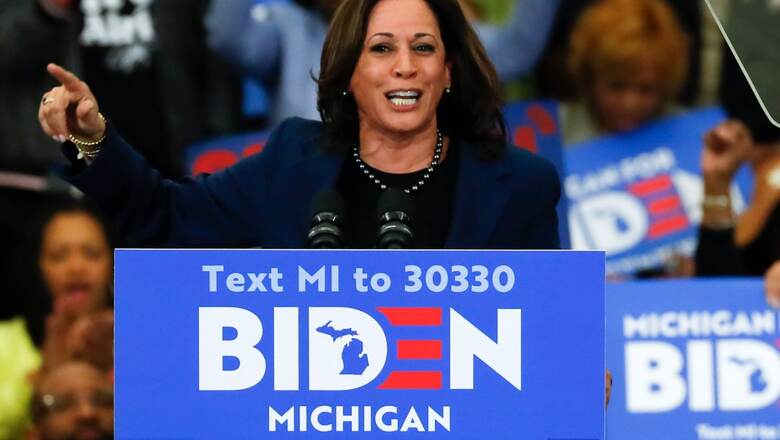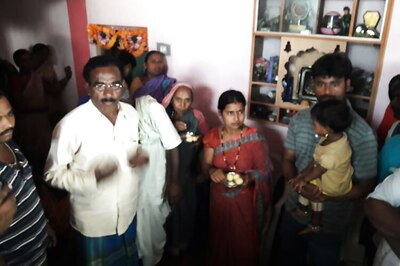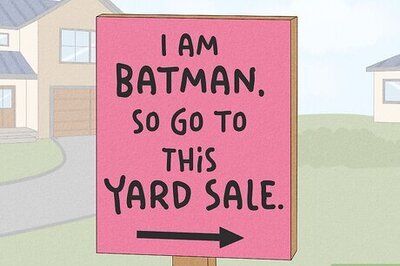
views
Kamala Harris is a lot of firsts.
Besides being the first Black woman on a major party's presidential ticket, she's also the first Indian-American. Her mother, Shyamala Gopalan, was born in Chennai’s Besant Nagar and immigrated to the US to attend a doctoral program at UC Berkeley. Like Barack Obama, a mixed-race heritage has allowed Harris to connect across identities and reach multiple audiences and voting blocs.
To understand what the announcement means to this community, I turned to the best source I know on Indian Americans and politics: Aziz Haniffa.
Haniffa was executive editor and a chief correspondent of India Abroad, an ethnic newspaper for our community that shuttered just a few months ago, due to advertising and Covid-19 strains.
He sent me an August 26, 2009, interview he did with Kamala Harris and gave me permission to excerpt portions. It's headlined: "Kamala Devi Harris: The 'female Obama' discusses her campaign for California attorney general."
The piece highlights the role of her Indian identity, sure to surface again in the coming months. Harris' rise as the daughter of immigrants -- one from Jamaica, one from India -- serves a powerful counter-narrative to President Donald Trump's anti-immigrant rhetoric and policies.
Aziz Haniffa: What did your mom instil in you, in terms of culture and heritage?
Kamala Harris: My mother was very proud of her Indian heritage and taught us, me and my sister Maya, to share in the pride about our culture. We used to go back to India every couple of years. One of the most influential people in my life, in addition to my mother, was my grandfather PV Gopalan, who actually held a post in India that was like the secretary of state position in this country. My grandfather was one of the original Independence fighters in India, and some of my fondest memories from childhood were walking along the beach with him after he retired and lived in Besant Nagar, in what was then called Madras.
He would take walks every morning along the beach with his buddies who were all retired government officials and they would talk about politics, about how corruption must be fought and about justice. They would laugh and voice opinions and argue, and those conversations, even more than their actions, had such a strong influence on me in terms in terms of learning to be responsible, to be honest, and to have integrity. When we think about it, India is the oldest democracy in the world -- so that is part of my background, and without question has had a great deal of influence on what I do today and who I am.
AH: Would it be true to say then that the roots of your civil rights activism began with those walks on the beach with your grandfather, as much as in your parents' involvement in the civil rights movement in the US during their student days at the University of California?
KH: It is important to not say one thing to the exclusion of the other, because I don't feel the need to do that. They are of equal weight in terms of who I am and the impact that they had on me growing up. My grandparents used to visit us in Berkeley all the time.
My grandfather and grandmother enjoyed the time they spent with people of all walks of life who were involved in the civil rights movement. I believe that one of the benefits of having travelled the world and having known different cultures is that you really understand and see very clearly that people, whoever they are, whatever language they speak, have so much more in common than they do differences.
AH: Some Indian-American politicians like Bobby Jindal have, after winning election campaigns in which they sought and received the support of the community, sought to distance themselves from their Indian-American heritage. What is your view on how the ethnicity factor plays out?
KH: I am proud to be who I am, I am proud of the influences that my family have had on my life, that my community had on my life, and similarly the influence of my mentors and colleagues and friends. One is not to the exclusion of the other -- I believe that point is at the heart of this matter. We have to stop seeing issues and people through a plate-glass window as though we were one-dimensional. Instead, we have to see that most people exist through a prism and they are a sum of many factors — everyone is that way, and that is just the reality of it.

















Comments
0 comment